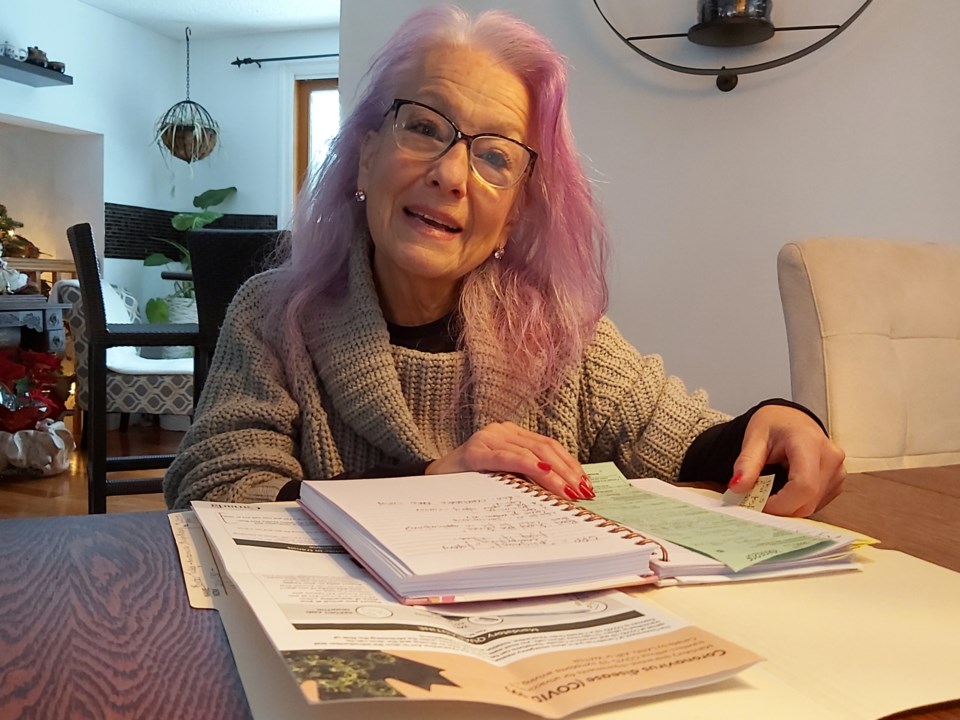After a business trip to Ohio, a Guelph woman expected to return home with relative ease at the end of November, as she’s fully vaccinated and some border crossing restrictions were being lifted.
However, Connie Cross says what happened that day and since has been anything but easy – something that’s likely to continue as she prepares to fight a $6,255 fine handed to her.
“I’m still in disbelief,” Cross said of how things unfolded, adding a little understanding could have gone a long way to preventing it all.
Cross’s ordeal began in November when she drove on her own to Toledo to tend to one of several investment properties she owns there, where she said tenants essentially “demolished” one of her rental units.
After a couple of weeks south of the border, the 74-year-old planned to cross back into Canada on Nov. 28 but held off a couple days because she heard requirements for reentry were being lifted, including the need to have a recent negative COVID-19 test result.
That shift in policy, however, doesn't apply to everyone.
"This exemption is only for trips originating in Canada taken by fully-vaccinated Canadian citizens, permanent residents or individuals registered under the Indian Act, who depart and re-enter by land or by air and can demonstrate that they have been away from Canada for less than 72 hours," states a federal government news release at the time.
Cross was in the States well over the 72-hour limit.
Unaware of this, when Cross reached the Windsor side of the border on her way home she was ordered to return to Detroit to be tested, which she said she gladly would have done had it not been getting late in the afternoon and the sun beginning to go down.
A year prior, Cross underwent cataract surgery on one of her eyes and intentionally doesn’t drive after dusk because of difficulty seeing.
She said she explained this to multiple border crossing officials, as well as concerns about sending a 74-year-old woman into an unfamiliar area, and even offered to sleep in her car out of concern she would end up killing someone on the road if she headed for Detroit right then, but they stood by the requirement.
The alternative, Cross said, was to accept a fine and complete 14 days of isolation at home, with a variety of associated reporting requirements.
Unaware the fine would be $6,255, Cross said she took the ticket so she could be on her way.
“I was not non-compliant, which is what the ticket says,” Cross insists. “At no time did I say I wouldn’t go to Detroit (for testing).”
Because of the lack of light, she stayed in a Windsor hotel overnight, being sure not to be in direct contact with anyone in the process, and continued toward Guelph in the morning.
During quarantine at home, Cross said her children dropped off supplies, as she was told not to even go outside.
Cross plans to contest the ticket ahead of the Jan. 12 deadline.
During quarantine, Cross said she was required to call Health Canada (HC) daily to confirm she was remaining at home. That, she said, was a web of automated systems that proved quite frustrating.
HC officials also called to check up on her.
One morning, Cross said she wasn’t able to “immediately” answer the phone and although she called HC back promptly to report in, a security officer showed up at her door that afternoon with questions about her whereabouts.
The next morning a Guelph police officer turned up to do the same.
“I was so totally humiliated,” Cross said.
With a few days to go before the cutoff for challenging the ticket, Cross said she’s preparing to send her objection notice via registered mail, which she’s since been told is acceptable.
“The government is pushing away Canadians,” she said. “It comes down to respect that is due to a human being.”



